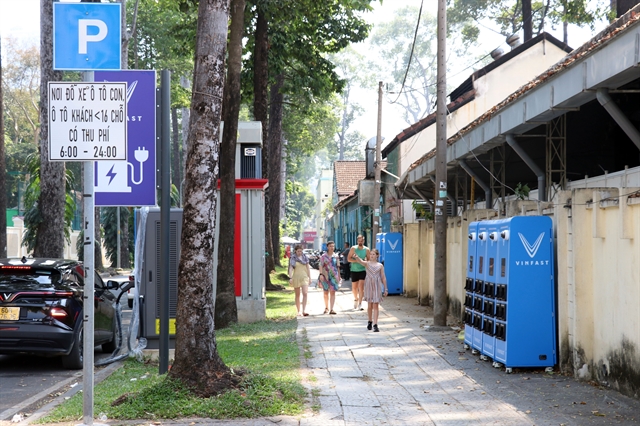 Society
Society

In the near future, millions of elderly people in Việt Nam will need support, so policies on social allowances and welfare work are needed to improve living standards.
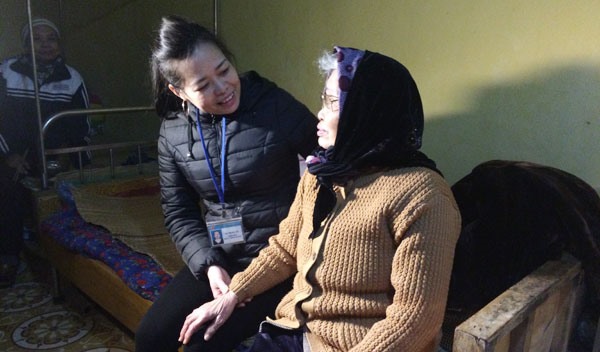 |
| A welfare worker at Hải Dương Social Sponsorship Centre gives advice on healthcare to an elderly woman. — VNS Photo Thu Trang |
Thu Trang
HẢI DƯƠNG — Vũ Thị Tiếp, 86, considers the Hải Dương Social Sponsorship Centre her second home.
Tiếp is from Thanh Thủy Commune in the northern province of Hải Dương, but has been living at the centre for the past 15 years.
Tiếp and her husband moved there after they retired, but he sadly passed away eight years ago.
“I live a long way from my hometown, but I don’t feel alone. I feel happy because the workers here care for me very well,” she said.
Every day, Tiếp recites poetry for her roommates and workers at the centre.
Tiếp is not the only one to find happiness at the centre.
Tiêu Công Vương, 70, from Thanh Hà District, has also lived there for many years.
When Vương was small, he became seriously ill, and had difficulty walking.
“I’ve found joy at the centre after many long sad days in my hometown because my wife died early and my son developed the same disease as me,” said Vương.
His family was poor so he and his son were taken to the centre.
“I used to think it would be bad living far from my hometown, but in fact my son and I are really fortunate here,” he said.
The centre sent Vương’s son to a vocational centre. Now he has job at an industrial zone, and returns to visit Vương every weekend.
“Since I have lived here, I have been taken care of and my health has improved. For my son and I, it is home,” he said.
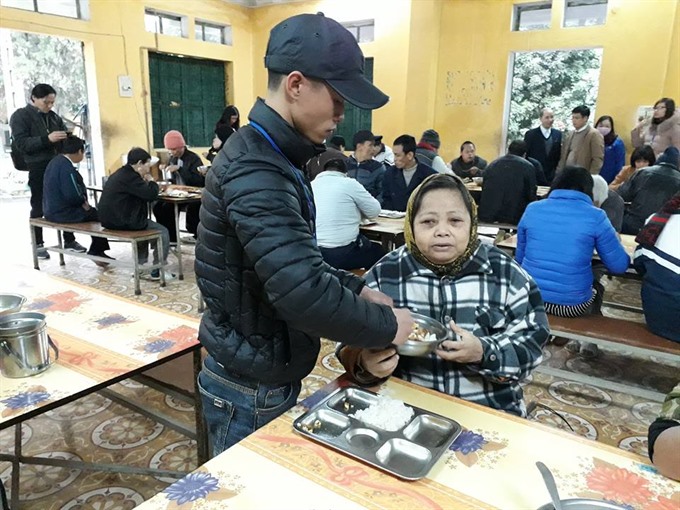 |
| A welfare worker at Hải Dương Social Sponsorship Centre feeds an elderly woman with visual impairment. — VNS Photo Thu Trang |
Trần Thị Thu Thủy, a worker at the centre, said she considered old people at the centre her grandparents.
“When an old person passes away, I feel sad like I’ve lost a family member,” said Thủy.
“Sometimes we are bitten by patients with mental diseases, but we keep calm and continue our work because we understand that without us, they do not have other support,” she said.
Thủy added that most people at the centre have different kinds of diseases, so their work is very hard.
“Many people are bedridden, which leads to skin problems, but we still take care for them with love,” she said.
The centre is home to 60 people over 60 years old.
Bùi Trọng Hải, director of the centre, said the average life expectancy was 74, but some until 98.
“We try our best to take care of both their material and spirit lives,” he said.
“Although there’s limited funding, meals here always ensure balanced nutrition. Workers grow their own vegetables to ensure a clean supply,” said Hải.
Every day, the nurse checks on the residents, and every six months, the centre invites doctors from hospitals to give general health examination to them.
“Upholding Việt Nam’s tradition of respecting old people, all of us work to fulfill our tasks,” he said.
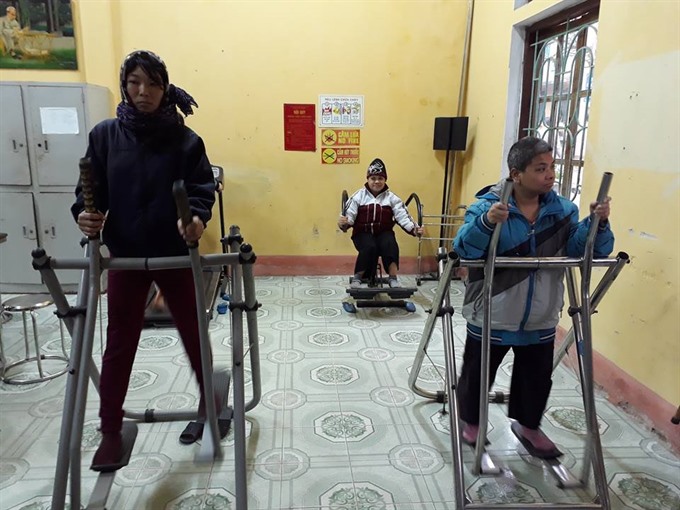 |
| People exercise at Hải Dương Social Sponsorship Centre. — VNS Photo Thu Trang |
Ageing population
Speaking at a conference on coping with an aging population held in Hải Dương Province last week, Deputy Minister of Labour, Invalids and Social Affairs Nguyễn Thị Hà said that in the near future, millions of old people in Việt Nam would need support.
“Completing a policy for social allowance and welfare services is necessary to improve living standards for the elderly,” she said.
Hà also said that improving social awareness on the role and importance of welfare work was urgent.
Statistics from the General Office for Population and Family Planning under the Ministry of Health showed that Việt Nam officially entered an ageing population in 2011, with the rate of over-60-year-old people occupying 10 per cent of the total population.
At present, the country has more than 10 million elderly people, and it is forecast that by 2030 and 2050, it will have nearly 19 million and more than 28 million elderly people, respectively.
International and domestic experts forecast that Việt Nam’s ageing population is likely to grow at one of the fastest rates in the world.
Trần Ngọc Diễn, editor-in-chief of the Labour and Society Magazine, said: “In terms of having just escaped from a low-income country and moving to the group of low-middle-income countries, the ageing population is posing major challenges for Việt Nam, not only related to healthcare but also socio-economic development.”
With an improved healthcare system and living standards, Việt Nam’s longevity has gone up. The average live-span is 75.6, ranking second in Asia and 56th in the world, Diễn said.
However, 65 per cent of old people has little access to healthcare.
Agreeing with Diễn, Nguyễn Ngọc Quỳnh, an expert from the United Nations Population Fund (UNFPA), said that Việt Nam’s disease burden was heavy, accounting for 15.3 years of a person’s life.
“At present, we must cope with the burden of double-disease.
"Most of them suffer from chronic non-infectious diseases which need long-term treatment such as diabetes, strokes and dementia," Quỳnh said, adding that the healthcare sector was unable to cope.
Investing in healthcare
Việt Nam’s system of nursing homes is gradually being developed.
However, only 49 out of 63 provincial and municipal hospitals across the country have geriatric wards, according to the Ministry of Health.
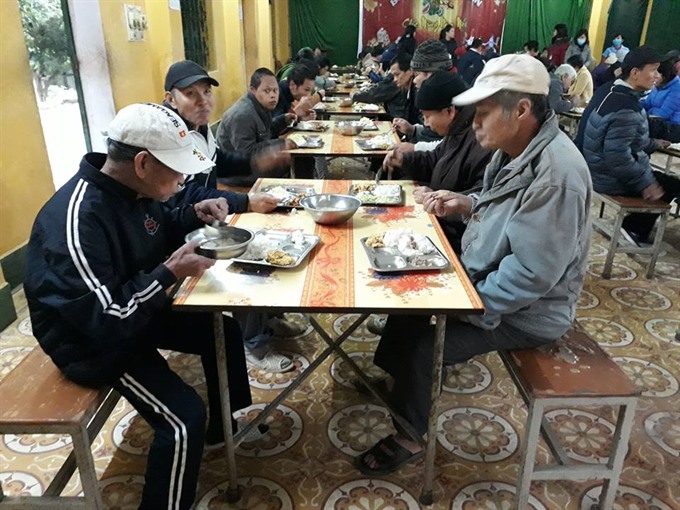 |
| Residents have dinner at Hải Dương Social Sponsorship Centre. — VNS Photo Thu Trang |
Potential
Many people nowadays believe the ageing population is a burden on socio-economic development. But sociologists and population experts say they are wrong. Healthy old people are a valuable resource but many countries do not know how to use them effectively.
Experts agreed that instead of being a burden, old people should be regarded as a resource.
Tiêu Thị Minh Hường, a lecturer at the Welfare Work Faculty under the University of Labour and Social Affairs, said organisations must take measures to encourage society to care for the elderly.
Besides, they should propose recommendations to the State to meet the increasing demands of the elderly.
“In the process of training welfare workers to cope with the ageing population, cooperation between State management agencies, service supply centres and training centres is needed,” she said.
Experts and policy researchers believe old people should be encouraged to join social activities to set up a modern advanced society.
Deputy Minister Hà said that to reach the target, policies should be developed comprehensively and quickly to deal with the issue. — VNS



